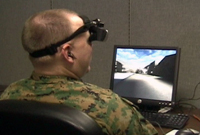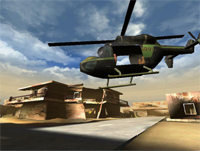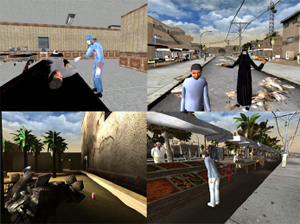PTSD
 |
 |
 |
19.1% of service members returning home form Iraq report having PTSD, major depression, or other mental disorders. 35% of Iraq war veterans accessed mental health services in the year after returning home. Mental health problems reported on the post-deployment assessment were significantly associated with combat experiences. To learn more about the causes and symptoms f PTSD, VRMC has tailored its focus towards post deployed soldiers being affected by PTSD. The battlefield with convoy, battalion camp, hospital, marketplace, and Iraqi village are the virtual environments that VRMC has created for subject exposure. In these scenarios, users with re-experience certain situations like a convoy ambush, patients screaming in pain, the littered streets of Iraqi villages, citizen interaction, and pre-operation at the battalion camp.
The first step in analyzing subjects with PTSD is to identify the stressors. Subjects are monitored by a real-time physiological device that records the subject’s vital signs, including heart rate, respiration, skin conductance, temperature, electroencephalogram (EEG), and electro cardiogram (ECG). From these recordings, researchers can identify which situations provide the most stress for the subjects. With accurate details based off of scouting reports, media, and soldier interviews, these environments fully immerse the subject in virtual Iraq, allowing him to re-experience the trauma that is the Iraq War without being exposed the life-threatening dangers associated with it.
System Components
VR Station
- 2 MS Windows XP Compatible PCs (Desktop or Laptop)
- Head Mounted Display
- Tracker
- Joypad
Physio Station
- MS Windows XP Compatible PC (Desktop or Laptop)
- Physiological Monitoring Device